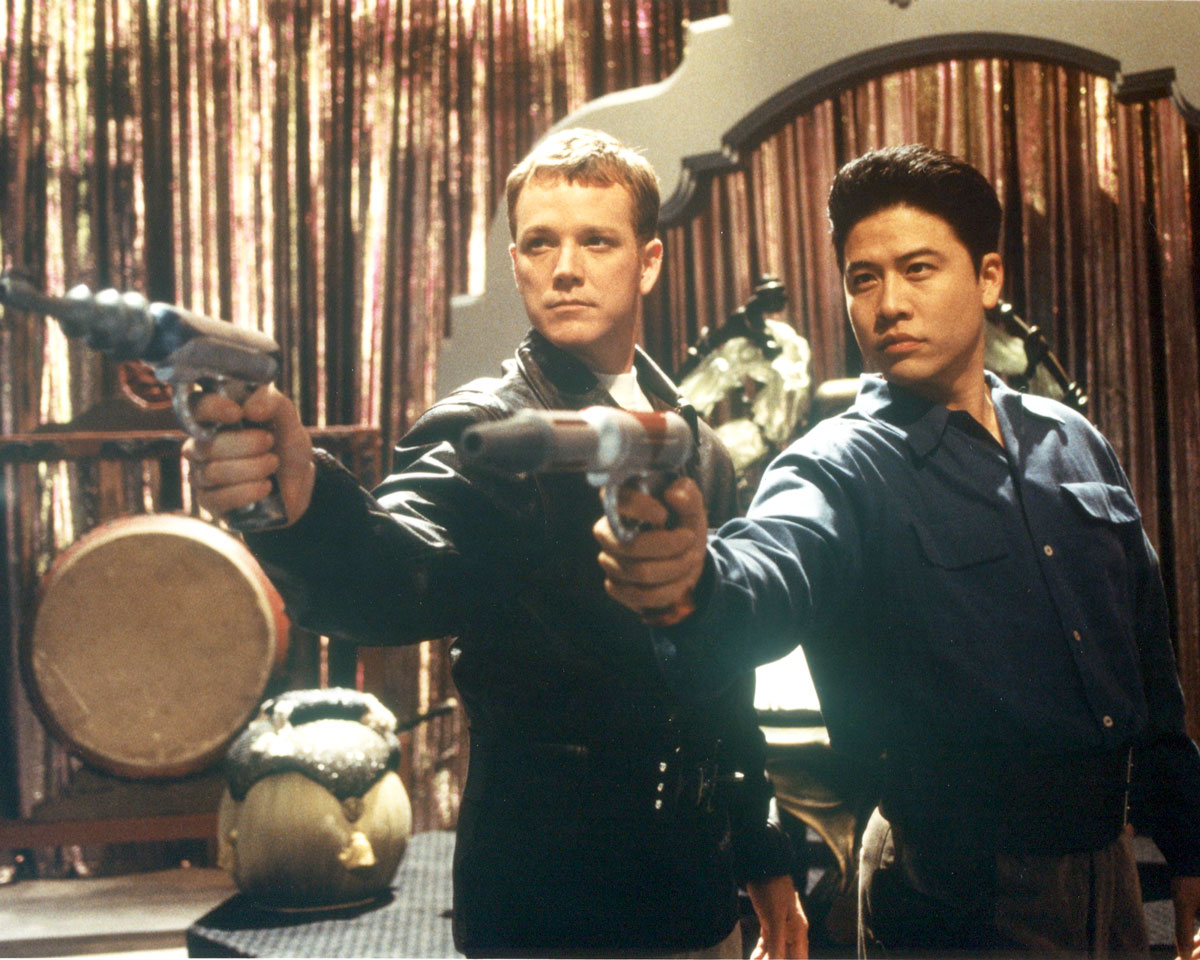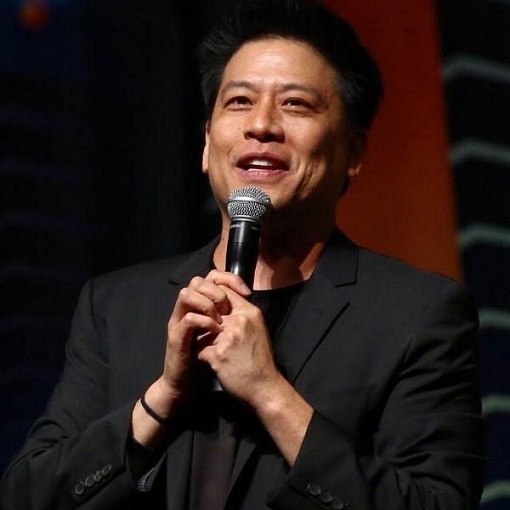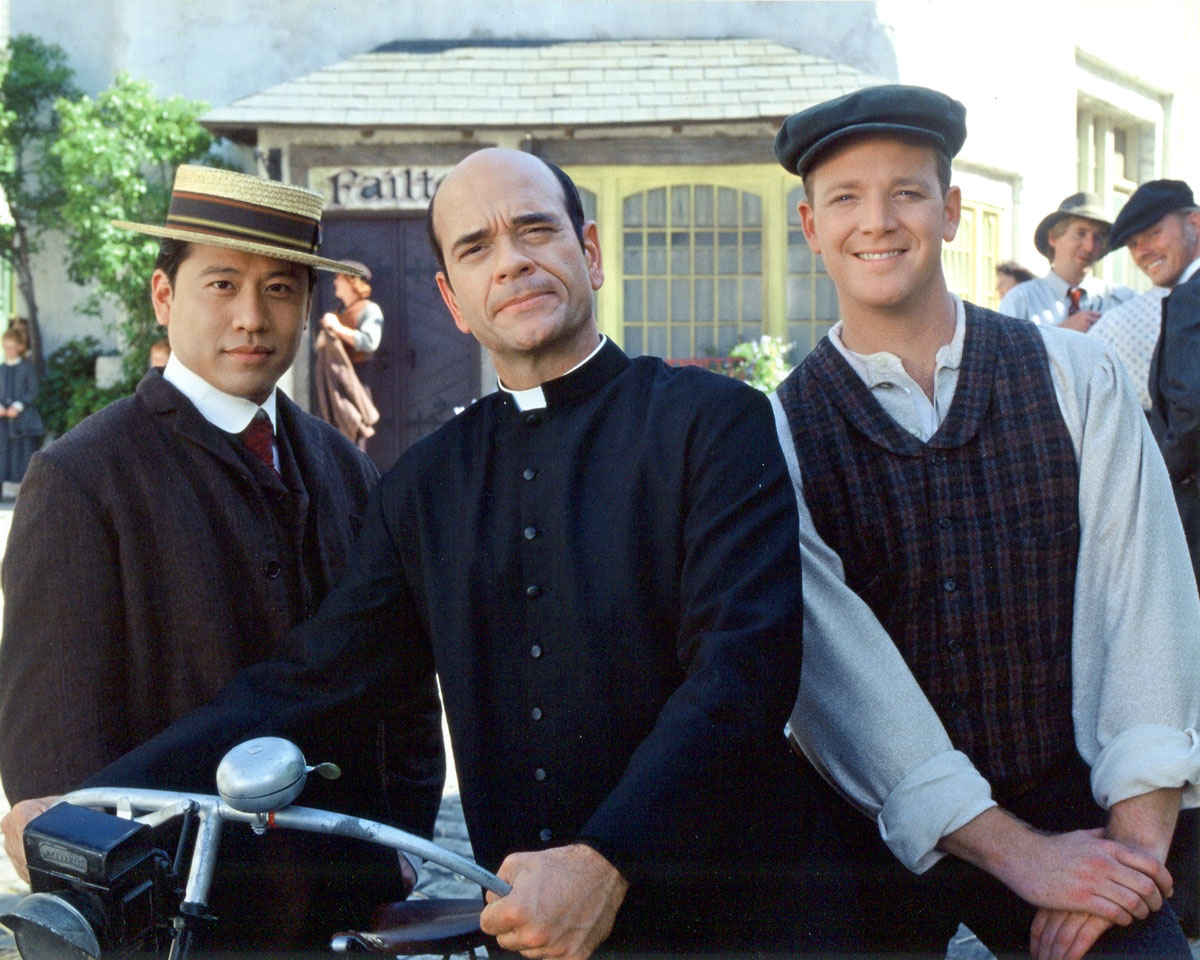Our July Spotlight Garrett Wang is known all across the world for his role as Harry Kim on hit TV series Star Trek: Voyager. Since his time on Voyager, Wang has been very active in the convention world as a moderator, has traveled extensively, worked on his golf game, and even started his own podcast. We’re so excited to catch up with Garrett.

1. This year marks the 25th anniversary of Star Trek: Voyager. What was it like working on this show? Any memorable moments on set?
It’s difficult to believe that we have already reached the 25th anniversary of Star Trek: Voyager. It seems like yesterday when I went in for my very first audition at Paramount Studios with Casting Director Nan Dutton. Self taped auditions did not exist back then.
Working on Star Trek was different from every other show in production at the time because we had to deal with extensive green screen work as well as having to learn how to navigate all the techno babble that was included in every episodic script. The hours were long, usually twelve to seventeen hours a day. I used to joke that filming a single episode of Voyager was more work than what the actors on “Friends,” which started the same year as Voyager, put in for an entire season on their show.
There were many memorable moments on the set. One particular moment that stands out happened while we worked on the Bridge set. Bridge work days were typically the longest days because of all the set up involved. Once, to break the monotony of a long day on the Bridge, I decided to entertain Kate Mulgrew, who played Captain Janeway, by dancing my version of “Riverdance,” the popular Irish stage dance performance from the 90’s, to pay homage to Kate’s Irish heritage. Not soon after I began my dance parody, the actors that portrayed Tom Paris, Tuvok and Chakotay lined up on both sides of me and joined in to create an impromptu synchronized dance routine. Kate practically fell out of her Captain’s chair from laughing so hard.

2. What was your favorite thing about playing Harry Kim?
My favorite thing about playing Harry Kim was probably the fact that being the youngest Starfleet officer on the crew meant that I was able to start with a blank canvas to create the character and add layers of nuance over the seven years worth of episodes. I know that the question didn’t ask this but I will also tell you my least favorite thing, which would be having to wear the extremely uncomfortable wool blend uniforms under the hot stage lights. They were designed to fit perfectly while standing. Any time I had to sit down it pulled in all the wrong places.
3. What has your experience been like being on a show with such a devoted fanbase?
Being on a show with such a devoted fan base has been nothing short of amazing. Many of these fans have been following Star Trek since the original series aired in 1966. They are loyal, intelligent, compassionate people who have shown their love and support for Trek in the past, present and will continue to do so in the future.

4. What do you most enjoy being part of the Star Trek universe?
What I most enjoy about being part of the Star Trek universe would have to be knowing how much my show, as well as the other Trek series, have influenced people in such a positive way. Unlike all the drama-filled reality programs being produced which serve only to glorify judgemental, petty and vain behavior, Star Trek has always provided viewers with underlying messages of hope and how to better ourselves, how to raise ourselves to a higher level of consciousness, how to bring out the best in people.
If all the leaders of the world were forced to sit down and watch every episode of Star Trek produced, I believe there would be no more armed conflicts. On the same note, if every police officer was forced to do the same thing, police brutality would cease to exist. I can’t tell you how many times I’ve met fans that have told me that watching Star Trek pulled them out of a bout of suicidal depression or fans that were in a horrible car accident with only a slim chance of recovery who relied on Star Trek to help them heal. Is there any other show in existence that can say they’ve saved countless lives? I am truly proud to be attached to a show which I consider to be “must watch TV.”
5. You later went on to play the role of Commander Garan in Star Trek: Of Gods and Men. How did this experience differ from that of Voyager?
“Star Trek: Of Gods and Men” was an independent Star Trek film, not produced by Paramount. It was directed by my fellow Voyager acting alumni Tim Russ. I remember it was not long after we wrapped Voyager when Tim called to ask whether I would be willing to work on the project. I initially turned him down because I was exhausted after seven long years of filming Voyager, but when he told me I would be playing a character that was the complete opposite of my role on Voyager, to portray essentially a mirror universe character, I said yes.
Although I enjoyed playing the part of Commander Garan, the filming itself was probably the toughest I’ve had to endure in my acting career. We filmed in upstate New York during August which was also the same time that a Harley Davidson festival was happening. The set was located in a building that lacked air conditioning and was situated next to a set of train tracks. So, not only did we have to deal with the blistering humid heat, we had many takes that were ruined whenever loud motorcycles or trains passed by. The producer also inexplicably opened up the set to a number of VIP fans, so in between filming, we were being bombarded by fan questions while trying to focus on rehearsing lines for the next set of scenes that we were about to film.
6. What did you most enjoy about playing Commander Garan?
As I touched upon before, in the previous answer, the chance to play the bad guy was what I enjoyed the most about playing Garan. It also helped that the script was well written.
7. You took some years off from acting to pursue other avenues. What other things were you able to do?
After Voyager ended, I worked on ST:Of Gods and Men as well as a nice role on the TNT mini series, “Into The West.” It was then, in 2005, that I made the decision to take a break from Hollywood. I have always loved to travel, but working on Star Trek was so time consuming that I was limited to weekend trips and thus only local flights.
So, from 2005 to 2010, I kind of went a little travel crazy. I visited thirty five countries during that five year time span. There was a time I flew back from Europe to the US, had a six hour break, where I went home to do laundry and then returned to the airport to fly to Asia. Three continents in 29 hours was definitely too much. I have since learned that moderation is the best policy.
After traveling non stop for five years, I slowed things down by picking up the game of golf which I proceeded to play practically every day for four years, although my golf handicap probably stayed the same. It was also around this time that I began to immerse myself in the personal appearance/convention world. I took on the job of Master of Ceremonies for Fedcon, the largest European convention. I also filled the role of Director of Star Trek programming for Dragon Con in Atlanta. It was during this phase of my life that I discovered that I had a knack for hosting panels and other convention related events. As far as I know, I was the first actor to go behind the scenes and work for a convention.

8. You mentioned your involvement in various conventions over the years – even interviewing Stan Lee at the Calgary Comic and Entertainment Expo in 2012. What is it like being a moderator?
Being a moderator started in 2010, when I became the Master of Ceremonies for FedCon, the longest running European Sci-fi convention, which takes place in Germany. It was also not too long after that when I took on the job of Trek Track Director for Dragon Con. Both roles required me to be on stage and moderate every guest actor. I quickly discovered that I had a knack for it and thus moderating became something that I truly looked forward to and enjoyed immensely. I then started to offer my moderating services to each convention that I was invited to. Some of the other conventions that I have been utilized as a moderator include Calgary Expo, Edmonton Expo, Montreal Comicon, Hal-Con, Phoenix Comicon and Denver Comicon. Of all the countless times I’ve served as moderator, the only time that I’ve actually been nervous and “fan boyed” was when I moderated Stan Lee for the first time. It still came off well, albeit my shedding a few tears of joy on stage with the man, the myth and the legend.
 9. You’re also very active on social media and have a notable following on Twitter. How do you think social media has changed the way we view and interact with celebrities?
9. You’re also very active on social media and have a notable following on Twitter. How do you think social media has changed the way we view and interact with celebrities?
Years ago, it was Robert Picardo, who played the Doctor on Voyager, that told me how important it was to have a healthy number of Twitter followers. He told me that Film and TV producers would often base their hiring decisions on which actor had the highest number of Twitter followers.
Social media has definitely changed the way fans interact and view celebrities. Before social media existed, your only option to interact with a celebrity was to send a letter which would take time to arrive and respond to. Nowadays, access and interaction is practically instantaneous. The way we view celebrities has changed as well. Pre social media, everyone would rely on magazines such as “People” or “Us” to read about what was happening in the lives of our favorite celebs. Now, we only need to jump onto social media to see what celebs are doing off camera.
10. What inspired your return to acting?
After taking almost a decade and a half off from acting, I started to feel the need to be creative once again. I missed the feeling I used to get when walking onto a set for the first time. I also had several friends encouraging me to return to the acting world. It was a chance meeting with Chris Roe at a convention in Canada that set all the wheels in motion for my return to acting.

11. More recently, you have created a podcast The Delta Flyers with fellow Voyager co-star Robert Duncan McNeill. Was podcasting something you had always been interested in? If you were to create another one – what types of topics would you want to discuss?
I’d like to start by saying that there is a podcast called “Delta Flyer” that was started by two Voyager fans a few years ago. My podcast, “The Delta Flyers” is an idea that I’ve had for over a decade now, but it took a pandemic for me to actually make this a reality. We uploaded our first podcast on May the Fourth, which funny enough happens to be Star Wars Day. Each week, we watch an episode of Voyager and discuss our thoughts about the episode as well as talk about what happened on set, behind the scenes. Originally, my idea was to do this podcast solo, but it was my significant other Megan, who suggested I ask Robbie to join me on this journey. I had considered Robbie as a potential co-host years before but ruled it out because he has always been so busy working as a television director and producer, I knew he wouldn’t have the time to participate. Once again, the pandemic intervened and the silver lining was that he had free time on his hands to be a part of my podcast idea.
If I had to create another podcast, I would love to do one discussing “Ancient Aliens” types of topics, such as UFOs, Aliens, the lost city of Atlantis, the Bermuda Triangle. Or maybe one where I just interview my favorite people from all walks of life, not just celebrities.
12. What is your dream role?
My dream role would be anything comedic. My resume is comprised of mainly dramatic roles but comedy has always been my true passion. Making people laugh would make me ecstatic. Growing up, I was a huge fan of Saturday Night Live. I also adored master impressionist Rich Little. I suppose my ideal role would be sketch comedy with an emphasis on impersonations.
13. What does the future look like for Garrett Wang?
The future I would like to manifest is one where I am either doing dramatic work which inspires people, not unlike Star Trek, or comedic work which makes people fall out of their personal “Captain’s chairs” laughing. After all, laughter is the best medicine.

